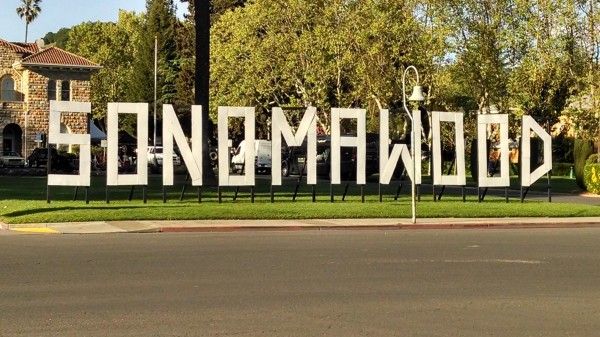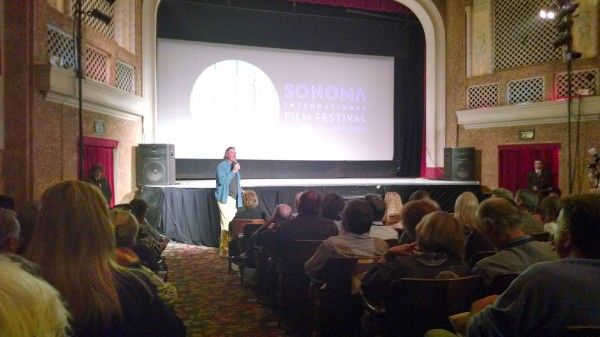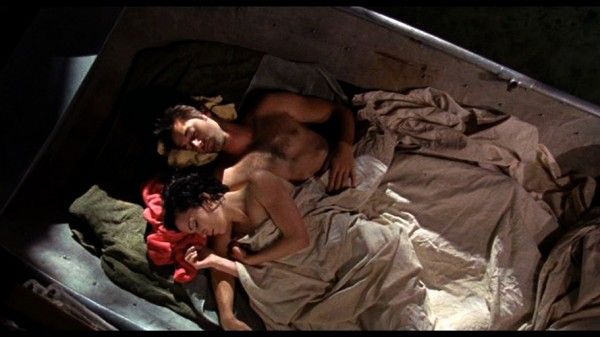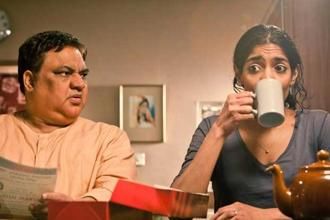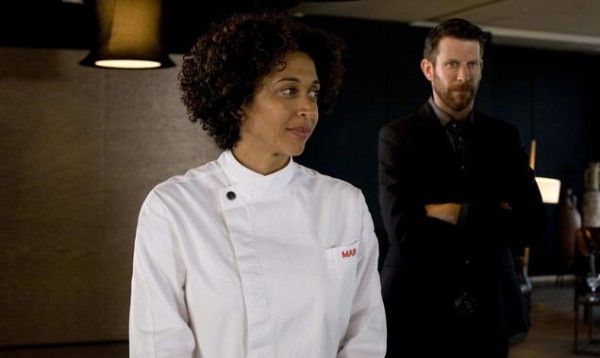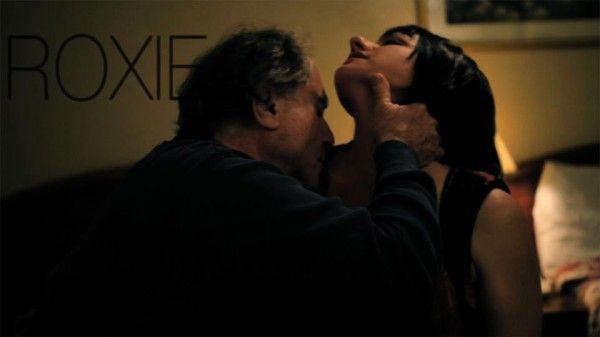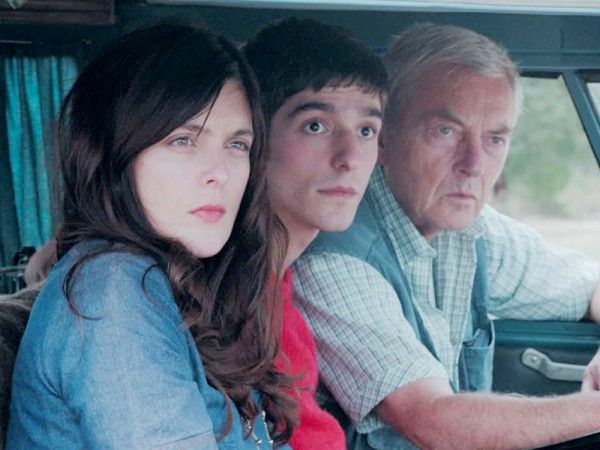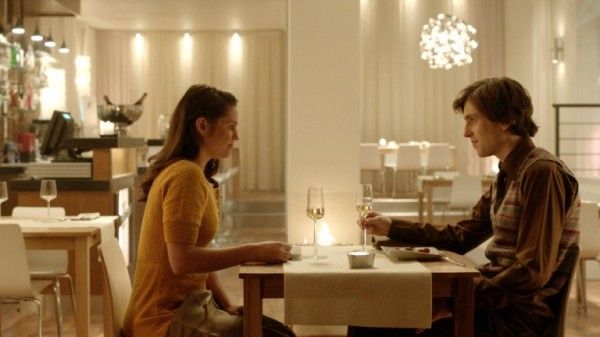Smack dab in the front of the city-square, white wooden 12-foot letters spell out the phrase “SONOMAWOOD”. For a week in April, this bon mot feels particularly appropriate as filmmakers, producers, press and film fans converge onto the city for the Sonoma International Film Festival.
Over this past week, Collider attended the 17th iteration of the festival, a celebration of independent filmmaking from across the globe. For a recap of the event and reviews of the features screened there, including Beside Still Waters, Jadoo, Tasting Menu, Roxie, and more, hit the jump.
Sonoma, a small city in the midst of Napa’s (and Sonoma’s own) wineries, stands in stark contrast to the metropolitan perception of California. Whilst driving down from the Oakland airport, you’ll see the as-expected traffic, grey buildings, factories, stadiums, complexes – but then all of the sudden these images will be replaced by farmlands, horses grazing on grass, wineries, stone looking mansions and missions… The festival itself is primarily located within the ‘Sonoma Square’, a park-like space surrounded by an eclectic mix of ‘Ma & Pa’ shops, boutiques, cafés, vintage theaters, ice cream parlors, cheese shops, art galleries, and so many damn wine tasting rooms (I counted four on one block alone).
The Sonoma Film Festival, now in its 17th year, showcases independent films from across the globe (over fifty features were screened this year). It’s an opportunity to see many films that more than likely won’t be available anywhere else. Independent filmmaking has never been in as dire an economic market as it finds itself now, the week of the festival somewhat ironically coinciding with a certain big-budget superhero film crushing box office records. The fact that the festival forgoes such higher-brand-name pictures in favor of smaller art films is to be applauded. It really does seem, regardless of quality, that every film screened here was a labor of love, post-screening Q&As revealing a majority of the movies to be self-financed and shot during weekends & vacation periods.
The crux of the festival’s allure lies in its intermingling of food, wine and cinema. Often before screenings, locally produced wine and beer are offered free of charge (in the morning hours – mimosas). A large tent in the middle of the Sonoma Square serves food from the surrounding restaurants throughout the day, as well as more wine and beer. It’s hard to find anyone at the festival without a glass of wine or beer or rum or a cocktail or champagne in his or her hands. Sometimes more than one beverage in both hands. For such readily available alcohol, one would expect a lot of drunken hooligans in the wee hours of the night – but once it hits 1:00AM, there is nary a drunkard to be seen. These Sonoma folks can obviously handle their liquor.
Sometimes, to be honest, it feels as if I’ve landed onto the island of the lotus-eaters. With all the entertainment that surrounds me, I question how anything gets done. The fact that people actually work in this area is a mystery that will never be solved. It’s even difficult to find the time to write this here article you have in your proverbial hand(s). Every time I attempt to jot a note down or get a head start on a review, there’s a free wine tasting or a breakfast or film or party or ho-down or dinner beckoning me away. Why even bother to write? Here - have this glass of Chardonnay. Everything is qualitatively ‘better’ here – the food: tastier, the people: friendlier, the drinks: more than plentiful. Hell, even the sky seems somehow bluer. I wonder why anybody would ever leave this place? The thought sends a shiver down my spine.
Even so, I find the time to see quite a number of films – nineteen in total over the five-day festival (excluding a number of short-films and programs attended). Certain trends begin to become apparent. An air of doom hangs over many of these pictures, as evidenced by many filmmakers eschewing of the present-day (metaphorically and literally) in favor of a reversion to the past or yearning for a future yet to be written. The present though remains as thoroughly fucked as it always was. This extends through many of the American independent features from the melancholy wistfulness of Besides Still Waters through the optimistic nostalgia of I’m Obsessed With You (but you’ve got to leave me alone), both films focusing on aimless Millennials seeking to recapture whatever it is they perceive they’ve lost through a rekindling/reliving of past misadventures. Documentary features like The Lightbulb Conspiracy & Plastic Paradise shine a light on human consumption and pollution and its deleterious effects(s) on the environment nowadays. Sure there’s the typical ten-minute epilogue on how to fix things and make it all better in the future, but there’s always something forced and obligatory about such denouements -- as if the filmmakers themselves aren’t sure whether or not such wishful thinking is at all accomplishable.
Even something as innocuous-seeming as the crowd-favorite documentary Taking My Parents to Burning Man becomes a reflective exercise in creativity-shunned, where the only answer to rampant corporate greed and the monotony of the ‘9 to 5’ is to regress back to a constant state of adolescence. Things don’t seem much better across the ocean either. Venezuelan picture My Straight Son focuses on the intolerance and homophobia at root there, while the Swiss-French entry Longwave takes aim at the growing wealth inequalities of the world. It’s not all doom and gloom though. There are quite a number of ‘food-related’ narrative films (Jadoo, Tasting Menu, Love and Lemons) – all of which illustrate the familial bonding effects of sharing/making a meal together, suggesting that no matter how bad it may get -- you can always count on your ma (or pa) to cook you ‘your favorite’. Home truly is where the heart is.
Below are a number of capsule reviews for films I saw throughout the festival. (Of note: I, of course, missed out on the actual festival winners: Best Independent Feature Brahmin Bulls, Best World Feature Siddharth and Best Documentary Feature The Human Experiment. Although I did catch Audience Award winners The Fourth Noble Truth (which I didn’t think much of) and Taking My Parents to Burning Man (which I liked just fine). My actual favorite film of the fest, the locally produced Roxie, went home with nothing. Take of this as you will.)
Beside Still Waters
Chris Lowell’s (probably best known as Piz from Veronica Mars) directorial debut features a nice roster of up and coming young actors (particularly excellent here is new SNL recruit Beck Bennett). In this quasi-homage to The Big Chill, a group of former high school friends gather in the wake of one of their owns parents’ deaths to drink, hash out old grudges, rekindle romance, bicker endlessly and, well, drink some more. There are some nice, if well-worn, bits on the impossibility of reliving your youth and the handicapping of nostalgia, but it all tends to get bogged down in twee emotional gobbledygook. There’s only so many pensive hand-held close-ups of mid twenty-somethings looking wistfully out into the ether that one can take. The game cast – which features, besides Bennett, Ryan Eggold (The Backlist), Brett Dalton (Agents of S.H.I.E.L.D.) & Britt Lower (Unforgettable) – almost make all the histrionics work; but the script credited to Lowell and writing partner Mohit Narang is too on-the-nose and familiar in its depictions of youthful malaise. Of course there’s the recently married couple with a lackluster sex-life AND the ‘successful’ friend who everyone resents AND the hopeless romantic who yearns to get back with his high-school girlfriend AND the secretly gay friend AND the promiscuous one. At a certain point, these people feel less like a diverse set of personalities and more like a checklist from a screenwriting book. Lowell, though, does show promise behind the camera ably interweaving still photography throughout the picture, hinting at the remnants of time long since past and never to come to fruition again. The movie has an amiable and earnest feel to it – making me wish I had liked it a bit more, but much like the film itself posits: some things just aren’t meant to be.
Jadoo
A charming if minor export from the UK, Jadoo (pronounced Ja-du) follows two hard-nosed Indian chefs/brothers who have a falling out and open competing restaurants right across the street from one another. It’s up to the daughter of one of said chefs to reconcile her father and uncle in time for her wedding reception. The decidedly low-key film features strong work from Harish Patel (probably most familiar as Simon Pegg’s landlord-cum-trainer in Run Fatboy Run) and Kulvinder Ghir (Bend It Like Beckham) as the dueling chefs. Patel has a particularly warm presence, a simple smile and shimmy of the head instantly putting you at ease – it’s an especially nice contrast when paired with Ghir’s more stern and arm’s-distant demeanor. Jadoo works best whenever these two men share the screen; however too much time is spent on the romantic travails and non-drama of Patel’s daughter (Amara Karan). It’s the usual time-padding nonsense of whether or not Karan’s devout father will approve of his daughter marrying an Englishman and his – the fiancée’s – insecurities about fitting in with such a traditional Indian family. The movie itself seems to realize the obviousness of such melodrama and solves the plight in the most slight, if amusing, imagining possible. There aren’t many surprises to be found in Jadoo and it all hangs on perhaps one too many miscommunication that could/would/should be solved with a single phone call; but when the film sticks to the communal and familial healing bonds of the kitchen, it’s hard not to forgive it its faults and want to hunker down on some of the exotic food on display.
Tasting Menu
Sort-of the ‘Short Cuts’ of foodie cinema, Tasting Menu once again presents the communal bonds that form when sharing a meal – a frequent theme it seems when dealing in cinema revolving around food. Here - a master chef (Vincenta N’Dongo) puts on one final tasting menu before she shuts down her award-winning restaurant for good. This allows the film to bring about an eclectic bunch of actors for this last dinner: Spanish actors Claudia Bassols and Jan Cornett as a recently separated couple; Irish actress Fionnula Flanagan as a countess grieving her late husband; Stephen Rea as a mysterious diner most of the restaurant staff believe to be a food critic; and Japanese actors Togo Igawa and Akihiko Serikawa as rival businessmen forced to share a table with an obnoxious assistant (Marta Torne). As is often the case with multi-narrative films, some stories work better than others. Rea, in particular, seems to relish his limited screen time; his story arc at first seeming the most trivial of the collective becomes surprisingly weighty and devastating in conclusion. Less successful are Bassols and Cornett as the typical stubborn lovers you spend the entire running time waiting for to get back together. Considering the film has to cut between half a dozen story arcs, not enough time can be spent with either Bassols or Cornett to make you truly care about their dysfunctional love story or the inherent predictability of its outcome. A late third-act dramatic shift to a sunken ship off the coast of the restaurant adds a much needed satirical bent to the picture, as all the various characters must put aside their petty problems and come together to save the marooned crew. There’s also a nice bit involving a mysterious dessert and its whereabouts that brought to mind the existential quandaries of Waiting for Godot. Ultimately any ‘food film’ (is there a technical term for such a sub-genre?) is only as good as the food it depicts. The ‘tasting menu’ created for the picture seems both delicious yet curiously austere, perhaps emblematic of the film itself – a pleasant enough viewing experience that still leaves you wanting.
Roxie
Seemingly another ode to the growing genre of ‘young’ people attempting to recapture their youth via drunken revelry, copious fornication and general disruptive behavior (see Beneath Still Waters) – newcomer Nick Frangione’s Roxie twists the genre on its head, switching out these ‘young’ people for folks on the cusp of senior citizen-hood. This proves to be all the difference needed. Whereas most of these type of films tend to get bogged down in the faux sincerity of ‘Just how hard it is to grow up, gosh darn it’, Roxie by switching the age group to those in their fifties/sixties reveals how hollow and shallow those wistful proclamations are. Dave (David Usner), a renowned marriage therapist and author, invites his best friend Joel (Joel Robbins), a colleague struggling to maintain his second marriage, on a two-day getaway to San Francisco. The trip, however, is merely an excuse for Dave and Joel to relive their adolescence – borrowing drugs from Dave’s college son, drinking heavily and prancing around in their underpants or less. When Dave suggests to Joel they call some prostitutes to break the monotony of his marriage, things soon to begin to spiral out of control. Enter the titular Roxie, a prostitute with a vague Russian accent, who seduces Joel whispering sweet-nothings into his ear about how she wants to run off and start a new life with him. Of course Roxie is much more than what she seems – as she forces these two men to confront just how much they have and how much they may have lost. Roxie, at its heart, is a tragedy about lives spent reliving the past, an unmasking of the harsh realities of time and aging, on the need for a real connection and how any false one inherently corrupts and leaves you bare. It’s a testament to zero-budget filmmaking (it was filmed locally in the Bay Area on a DSLR) and how even the smallest of films can possess the greatest of ambitions. It was, by far, the best film I saw during my stay at Sonoma.
Longwave (Les Grandes Ondes)
There’s a sequence two-thirds through Lionel Baier’s Longwave wherein the Portuguese militia corner a group of radical female protesters. A nearby car radio (playing a tune by tango-extraordinaire Carlos Gardel) interrupts the sure-to-be violence, prompting the militia & protestors into a spontaneous dance off. The moment, emblematic of Baier’s attempt to meld serious political content with absurdist farce, highlights the film’s ambitions while also revealing Baier’s inability to successfully merge the two. It’s a tricky tone to get right – and the film whiplashes between such comic hijinks and contemplative moralizing a bit too haphazardly. French comedian Michel Vuillermoz stars alongside Valérie Donzelli and Patrick Lapp as a trio of French-Swiss radio journalists sent to Portugal during the mid 1970s to write a puff piece on the ‘positive’ Swiss relief provided there. The joke here is that the Swiss have pretty much done nothing for this ‘less developed’ region – a trip to a nearby Portuguese school revealing the only Swiss donation to be a solitary clock and faucet. Another trip to a Swiss-financed condominium proves even less helpful to their philanthropist cause – as the condominium turns out to be a complete wasteland out in the middle of nowhere. When a full-blown military coup suddenly erupts in Portugal (the Carnation Revolution for historical buffs), the journalists must decide whether to join the uprising & protest the growing wealth divide in the country or return back to their posh homes in Switzerland. As can perhaps be easily inferred, the film uses the historical precedent of the Portuguese uprising as a means to comment on the poverty and growing wealth inequalities of the present – a surprisingly bittersweet epilogue nailing this point home. There’s some fun bits in the movie – I was particularly taken with the budding non-romance between Vuillermoz & Donzelli, as well as how both Vuillermoz and Lapp become unintentional benefactors of the revolution (Vuillermoz as a figurehead for the coup; Lapp – as the ‘object of affection’ for a number of female radicals). The film never quite coalesces though, neither funny enough to work as a comedy nor insightful enough to work as political subversion. It exists somewhere in the middle – at once both good enough and yet entirely disappointing.
Love and Lemons (Små Citroner Gula)
‘It’s not what you say; but how you say it.’ Pure comfort food, the sweet Love and Lemons infectiously proves that old adage true. Agnes (the lovely Rakel Wärmländer), a struggling Swedish cook recently fired from an upscale French bistro, puts all her money (and much of her parent’s) into starting up her own restaurant. When the restaurant struggles in the early going, Agnes turns her attention to seducing her neighbor – an influential food critic (Sverrir Gudnason) – in the hopes he will give her restaurant a positive review. Of course there are the obvious complications as she slowly starts to fall in love with the critic and questions whether or not she should come clean about her ignominious intentions. You know it’s only a matter of time before he’ll find out anyway and then they’ll have a falling out, only to later realize they’re actually perfect for one another -- all leading to the inevitable happy coupling; but how we get there proves charming enough to make the foregone conclusion worthwhile. Once again food here is used as a means to illustrate the ties of family. Besides the romantic comedy pairing of Wärmländer & Gudnason, the central relationship lies between Agnes and her stay-at-home mother (Anki Laden), who has taught her everything she knows about cooking. Their scenes together – as Agnes struggles to perfect her mother’s best dish (a fish stew) – prove to be the most poignant in the picture. It’s this added relationship that gives the film a dramatic heft, separating itself from the usual romantic-comedy trash. Romantic comedies often times feel like the most maligned of genres – it’s hard to think of many worthwhile ones made in recent memory -- so the simple pleasures of Love and Lemons seem downright extraordinary by comparison.
The 17th Annual Sonoma International Film Festival ran from April 2nd through April 6th. I’ve already marked my calendar for the next year.
*A special note of thanks to Howard and Diane Egger-Bovet who graciously allowed me to stay at their home during the course of the festival.


